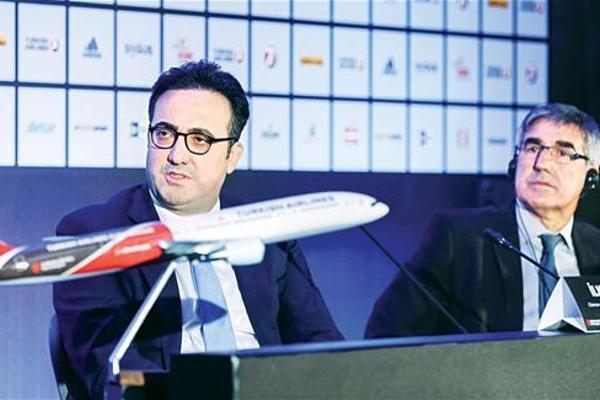Turkish Airlines seeks to weather 2016 turbulence
ISTANBUL - Agence France-Press


This file photo taken shows an aircraft operated by Turkish Airlines on the tarmac after landing at Hanover airport. The company is determined to continue its double-digit growth, says chairman Aycı (inset).
‘Turkish Airlines will continue to be an engine of growth, but this year is a hiccup, a very challenging year,’ the turkish flag carrier’s chairman İlker Aycı says, adding that 2017 will be a much better yearEven by the fraught standards of global aviation, 2016 has been tough for Turkish Airlines.
In June, its main hub Atatürk International Airport in Istanbul was hit by suicide bomb attacks by Islamic Satte of Iraq and the Levant (ISIL) militants, and then on July 15 coup soldiers tried to take control of the airport.
Both incidents caused the temporary closure of Turkey’s biggest airport, but the airline managed to resume flights the subsequent day, in a crucial message of business as usual and a symbol of Turkish Airlines’ importance for the country’s image and economy. Yet while Turkish Airlines proudly boasts of its resilience in the face of the repeated attacks and the failed coup attempt, Turkey’s traumatic 2016 has taken its toll on the group and its ambitions.
After years where it was one of the few global airlines to reliably make profits, it recorded a $647 million loss in the first half to June, even before the effects of the coup are taken into account.
Meanwhile, brakes have been slammed on its exponential growth, which has seen the ambitious carrier move from just 10.3 million passengers in 2002 to 61.2 million in 2015.
Growth this year has been far slower and the company expects to take a total of 63.4 million passengers in 2016, with most of that increase coming in domestic flights.
“In the last decade Turkish Airlines was one of the most profitable airlines in the world,” company chairman İlker Aycı told journalists AFP in Istanbul on Sept. 30.
“Turkish Airlines will continue to be an engine of growth,” he vowed. “But this year is a hiccup, a very challenging year.”
“We are very determined to continue our double-digit growth but unfortunately not this year,” he said, adding that the company is “financially very solid.”
Turkish Airlines stock has lost over 30 percent of its value on the Istanbul exchange so far this year, even though it has traded relatively flat over the last month. On Sept. 30 its shares closed at 5.15 lira compared with 7.39 lira at the start of the year.
Aycı revealed that the company was suspending some routes in southern Europe for the winter to better use capacity -- including Bordeaux, Pisa and Genoa -- but insisted the routes were not being closed and the airline would return.
“2017 will be like 2015 -- not 2016,” said Aycı.
Turkish Airlines was transformed into a major international player after privatization from 2004-2006 that left the government with a minority stake of just over 49 percent.
But it remains a national champion and, as Turkey’s biggest exporter.
The airline strongly opposed the July 15 failed coup attempt, putting messages on its websites and in-flight screens.
Travelers even found color brochures celebrating the defeat of the coup, along with the usual in-flight magazine, in their back seat pockets.
“If they [the plotters] had succeeded we would have lost tens of thousands of people... we would have lost the legally-elected government,” said Aycı.
Tourism however has plunged in Turkey due to this year’s crises, with foreigner arrivals down almost 38 percent in August, and a dispute with Russia, a key market, not resolved in time to save the season.
While the airline remains hugely dependent on the security situation, it is still ploughing on with its growth plans, opening new routes to Havana, the Seychelles and even Zanzibar in the next months, with Aycı revealing a plan for Mexico City.
A cornerstone of its long-term growth is the new Istanbul airport by the Black Sea, a key infrastructure project that is set to open in the second quarter of 2018.
Aycı said the new airport will have a capacity for 90 million passengers annually in first phase after opening -- well over the current 70 million at Atatürk -- and then up to 150 million, meaning it could overtake Paris Charles de Gaulle and London Heathrow as Europe’s largest airport.
“The airport will be very important for our growth. We are so excited,” he said.
